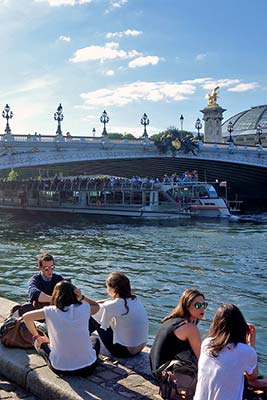
Paris is among the world’s most popular cities, and with such a robust tourism industry, travelers can feel cut off from “real life” in the City of Light. Fortunately, Paris offers beaucoup ways for you to connect with locals and experience French culture, cuisine, and uniquely Parisian activities. Hang out at a “beach” on the Seine, tour the city at night in a vintage, open-top Deux Chevaux car, try your hand at the game of boules, or dance under the stars. Experiences such as these will make your trip more personal...and more memorable.
I’m amazed at the number of groups that help travelers meet locals. These get good reviews:
Meeting the French puts travelers in touch with Parisians who offer specialty tours, help organizing your trip—from soup to nuts—and more (fees vary by activity, +33 1 42 51 19 80, www.meetingthefrench.com).
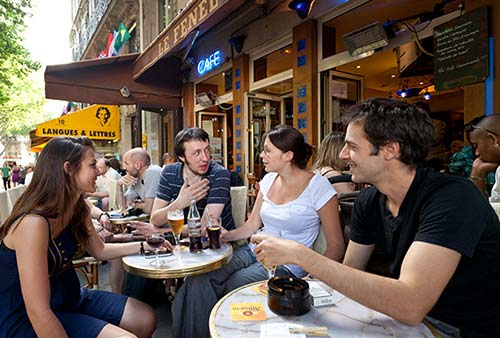
Paris Greeter is an all-volunteer organization that connects travelers with English-speaking Parisians who want to share their knowledge of the city. The volunteers act as informal companions who can show you “their Paris”—it’s like seeing Paris through the eyes of a friend. The tours are free (though donations to the organization are welcome); sign up five weeks before your visit (shorter lead times may be possible, www.greeters.paris).
The American Church, an interdenominational church in the Rue Cler neighborhood, offers many services for travelers wanting to connect with Parisian culture. English-language worship services are held every Sunday (at 11:00, contemporary service at 14:00). The free Sunday concerts (generally Sept-June at 17:30, but not every week and not in Dec) are a good way to meet the very international congregation (65 Quai d’Orsay, Mo: Invalides, +33 1 40 62 05 00, www.acparis.org).
Lost in Frenchlation offers weekly screenings of French films with English subtitles for people looking to immerse themselves in the city’s cultural scene. Venues vary from the elegant Champs-Elysées theater, Club de l’Étoile, to L’Entrepôt—a small, independent cultural space with three art-house screening rooms, a restaurant, a garden, a cocktail bar, and an art gallery. Events are preceded by a happy hour, during which you can connect with locals and travelers alike. After some screenings, the venue hosts Q&As with the film crews. They also host monthly comedy nights in English (€7-10, discounts for students and seniors, buy tickets online in advance or at the door, +33 6 67 33 39 75, www.lostinfrenchlation.com).
Cooking Schools and Wine Tastings: It’s easy to hook up with small cooking schools and wine-tasting classes that provide an easygoing, personal experience (see “Connecting with the Cuisine,” later in this chapter).
Language Classes: You’re at Kilomètre Zéro of the French language—where better to take a class? French-language classes are offered for all levels, and class sizes are usually small. Alliance Française has the best reputation and a good variety of courses (101 Boulevard Raspail, +33 1 42 84 90 00, www.alliancefr.org). France Langue provides intensive classes on a weekly basis, some focusing on topics like wine, sports, business, or culture (+33 1 80 05 21 32, www.france-langue.fr).
Adopt a Café: Find a café or wine bar near your accommodation and stop by each day. You might see others doing the same and get to know your server at least un peu. Bring a book or writing material (put down your phone!) and go local.
Adopt a Chair: Paris parks are good places to slow down and meet others. Find a chair at a central location (often by a pond) and settle in. Go ahead—strike up a conversation with your neighbor. If you have kids, the Luxembourg Garden, Tuileries, and Champs de Mars parks all offer kid-friendly activities (see the Paris with Children chapter), allowing you more chair time (and kids are a natural way to meet locals, too).
Long-term American residents can give you surprisingly keen insight into life in Paris.
The American Church, described earlier, is the community center for Americans living in Paris.
The American Library, in the Rue Cler neighborhood, offers a wide variety of free programs and events for adults and children (10 Rue du Général Camou, Mo: Ecole Militaire, +33 1 53 59 12 60, www.americanlibraryinparis.org).
WICE (Women in Continuing Education) is a nonprofit association that provides an impressive array of cultural and educational programs in English as well as social gatherings for those eager to master the art of living in France. Check their schedule at www.wice-paris.org, or call +33 1 45 66 75 50.
Meetup connects people in cities around the world, whether they are in town for a day or longer. Sponsored events include picnics, group sports, museum tours, cocktail evenings, and more (www.meetup.com, search “Paris” to find groups according to your interests).
To dig deeper into the food scene in Paris, consider a culinary walking tour or a class. These are just a few of the many available.
Some of my “Cooking Classes” listings also offer food tours.
Paris by Mouth offers well-respected yet casual small-group tours, with a maximum of seven foodies per group. Tours are organized by location, street market, or flavor and led by local food writers (€125/3 hours, includes tastings, www.parisbymouth.com).
Friendly Canadian Rosa Jackson designs personalized Edible Paris itineraries based on your interests. She and her colleagues also lead three-hour “food-guru” tours of Paris (unguided itineraries—€125-200, guided tours—from €300 for 1-2 people, larger groups welcome, +33 6 81 67 41 22, www.edible-paris.com).
Le Food Trip helps travelers create their own gourmet food tour by connecting them with local artisans and shopkeepers. Sign up online and get a Tasting Passport booklet with a good orientation to French foods, a map, and locations of shops where you’ll be welcomed like a local. The pass includes a choice of products, from wine to croissants to croque monsieurs (from €30, valid for 1 year, www.le-food-trip.com).
At Les Secrets Gourmands de Noémie, charming and knowledgeable Noémie shares her culinary secrets with hands-on fun. Classes are designed for French or English speakers and can be in both languages, depending on the participants (€85-140, possible add-on market tour, 92 Rue Nollet, Mo: La Fourche, +33 6 64 17 93 32, www.lessecretsgourmandsdenoemie.com).
Cook’n with Class offers a range of convivial classes on breads, macarons, croissants, wine and cheese, and more—including market visits—with a maximum of six students. Tasting courses are offered as well (classes from €115, multiday classes available, 6 Rue Baudelique, Mo: Jules Joffrin or Simplon, +33 6 31 73 62 77, www.cooknwithclass.com/paris).
La Cuisine Paris has a great variety of classes in English, reasonable prices, and a beautiful space in central Paris (€70-100, €189 for 4-hour class with market tour, also offers gourmet visit to Versailles, 80 Quai de l’Hôtel de Ville, +33 1 40 51 78 18, www.lacuisineparis.com).
For an upscale demonstration course, try Le Cordon Bleu (+33 1 53 68 22 50, www.lcbparis.com) or Ritz Escoffier Ecole de Gastronomie (+33 1 43 16 30 50, www.ritzparis.com).
Many cooking outfits offer wine-tasting options, but Ô Château is decidedly wine-centric. Its team of sommeliers teach wine-tasting (in English) in the 18th-century residence of Madame de Pompadour. Their goal is to “take the snob out of wine” with informative but easygoing classes that teach the basics of French wine regions, the techniques of tasting, and how to read a French wine label. Register online using code “RS2024” for a 10 percent discount, or check the website for last-minute deals (tastings last about 2 hours, 12 people max, 68 Rue Jean-Jacques Rousseau, Mo: Louvre-Rivoli or Etienne Marcel, +33 1 44 73 97 80, www.o-chateau.com).
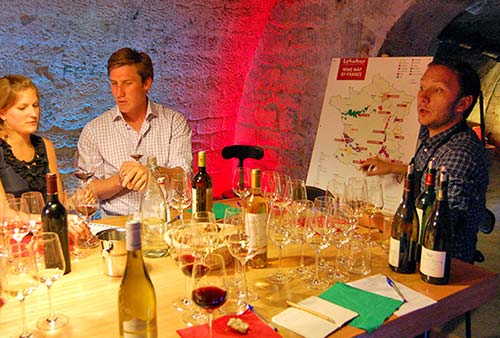
Le Cheese Geek delivers fun and informative cheese tastings. Using quizzes, charm, and sometimes blindfolds, owner Fabrice and his cheesemonger crew demystify a food the French take very seriously. They pair six seasonal cheeses with three beverages—not just wine but also cider, beer, liqueur, or juice, depending on the cheese (2-hour class from €65, 31 Rue Ste. Marthe, Mo: Belleville, +33 7 82 03 50 03, www.lecheesegeek.com).
With Eatwith, you’ll join a community of food and travel lovers seeking an insider’s dining experience. Enjoy a meal with a Parisian family, a cooking class, a food tour, or a pop-up food event hosted by friendly locals (www.eatwith.com).
At the cost of closing two busy expressways along the Seine, Paris has reclaimed sections of the river’s embankment in a fun-loving project stretching several miles. These traffic-free areas are a new world for strolling, biking, having fun with the kids, dining (in pop-up drinking and eating establishments or at extravagant picnics complete with tablecloths and Champagne)—or simply dangling one’s feet over the water and being in the moment. One section runs along the Left Bank of the Seine between Pont de l’Alma (near the Eiffel Tower) and the Orsay Museum, and another runs along the Right Bank between the Louvre and Place de la Bastille. In balmy weather, the embankment takes on a special energy. The gaggle of bars and fun eating spots at Pont Alexandre III (Left Bank) and across from Ile St. Louis (Right Bank) are particularly lively. The riverside promenade is fine for strolling or biking.
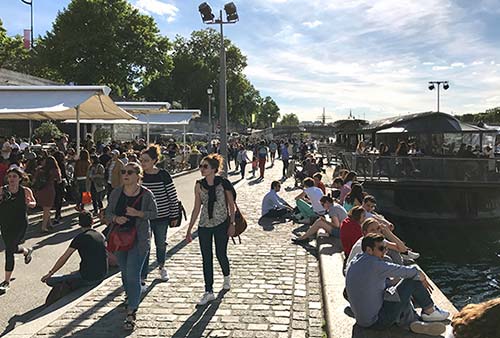
The Paris Plages (beaches) add lots of beach activities each summer. The Riviera it’s not, but this string of fanciful faux beaches—assembled along a one-mile stretch of the Right Bank of the Seine—is a fun-filled place to stroll, play, and people-watch. Each summer, the Paris city government trucks in potted palm trees, hammocks, and lounge chairs to create colorful urban beaches. You’ll also find “beach cafés,” climbing walls, prefab pools, trampolines, a library, beach volleyball, badminton, and Frisbee areas. (Other less-central areas of town, such as Bassin de la Vilette, have their own plages.)
Cost and Hours: Free, promenades always open, plages run mid-July-mid-Aug daily 8:00-24:00, on Right Bank of Seine, just north of Ile de la Cité, between Pont des Arts and Pont de Sully.
While Paris is crisscrossed with bike lanes, most are adjacent to regular traffic or mixed with bus-only lanes (ouch). The most relaxing and scenic Parisian joyride on two wheels is along its riverside promenades (described above), with nary a car in sight. A four-mile stretch runs through the heart of the city, from near the Eiffel Tower to below the Bastille; the round-trip ride makes a wonderful experience of about an hour or so. It could be much longer if you succumb to the temptations of the lounge chairs, hammocks, outdoor cafés, and simple delights of riverside Parisian life.
I like starting at Pont de l’Alma, near the Eiffel Tower on the Left Bank. Head east, passing under four bridges (about 1.5 miles) to the Orsay Museum. Just past the Orsay, climb to street level and cross to the Right Bank on Pont Royal. Now on the Right Bank, continue east on Quai Mitterand (with a broad sidewalk), passing the Louvre Museum. Find the cobbled ramp down to the river near the Pont des Arts. You’ll bump along cobbles for a few blocks before merging with the smooth-as-silk road. You’ll pass the two islands and finally reach the end of our ride (and turn around) at the tunnel entrance. (To trace this bike route, set out with the “Eiffel Tower & Nearby” map on here, pedal across the “Major Museums Neighborhood” map on here, and gear down on the “Marais Neighborhood & Nearby” map on here).
Avoid pedestrians or pedaling into the river—you’ll be distracted by beautiful buildings and world-famous sights. You can extend your ride by side-tripping through grand Parisian parks like the Champs de Mars (under the Eiffel Tower) and the Tuileries (the Louvre’s front yard—bikes allowed only in section closest to river).
Renting Your Bike: To do this as a one-way trip, use a Vélib’ or other city bike-share option (see details on here and check the Vélib’ app or website for locations, www.velib-metropole.fr [URL inactive]). You can also pop into a bike rental shop (Fat Tire Bike Tours near the west end, Bike About Tours at the east end—see here).
If rumbling around Paris and sticking your head out of the rolled-back top of a funky old Citroën 2CV car à la Inspector Clouseau sounds like your kind of fun, two enterprising companies have you covered with a veritable fleet of these “tin-can” cars. (Night is best for the tour; skip it in daylight.) The informal student-drivers are not professional guides and their services can be unreliable—but they will speak some English. Appreciate the simplicity of the car. It’s France’s version of the VW Beetle and hasn’t been made for decades. Notice the bare-bones dashboard. Ask your guide to honk the horn, run the silly little wipers, and open and close the air vent—c’est magnifique!
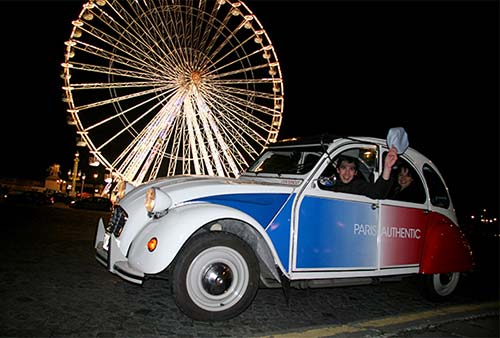
Either of these companies will pick you up and drop you at your hotel or wherever you choose. 4 Roues Sous 1 Parapluie (“4 wheels under 1 umbrella”) offers several tours with candy-colored cars (for 2 people it’s about €50/person for 45 minutes or €75 for 90 minutes; 10 percent tip appropriate if you enjoyed your ride, longer tours available, maximum 3 people/car, +33 1 58 59 27 82, +33 6 67 32 26 68, www.4roues-sous-1parapluie.com). Paris Authentic offers similar options and prices (+33 6 64 50 44 19, www.parisauthentic.com).
This low-impact sport is fun to watch and easy to learn. You’ll see people of all ages launching metal balls in parks throughout Paris. Stop if you pass a game in progress and enjoy watching the players as they mull their next shot, then debate which ball is closest to the target. The games are informal and a joy to observe—and play! Ask at your hotel where you can buy a set of boules de pétanque. Find a space near the games you’re watching and, allez, give it a shot. Here are a few central places to watch pétanque (usually later in the afternoon): Luxembourg Garden (Mo: St-Sulpice or RER Luxembourg), the Esplanade des Invalides park (in the southwest corner; Mo: Invalides), Palais Royal gardens (Mo: Palais Royal), les Arènes de Lutece (a sure bet in a one-time Roman arena, Mo: Cardinal Lemoine).
In-line skaters take to the streets most Sunday afternoons and Friday nights. It’s serious skaters only on Fridays (they meet at 21:30 and are ready to roll at 22:00), but anyone can join in on Sundays (at 14:30). Police close off different routes each week to keep locals engaged.
On Sunday, skaters leave from the south side of Place de la Bastille (for the route, see www.rollers-coquillages.org); the Friday start point varies by week (see www.pari-roller.com). You can rent skates near the Sunday starting point at Nomadeshop, but pick them up on Saturday (about €10/day, closed Sun-Mon, 37 Boulevard Bourdon, near Place de la Bastille, Mo: Bastille, +33 1 44 54 07 44, www.nomadshop.com).
On warm summer evenings, some Parisian parks and riverfront quais are alive with dancing. Go to ParisInfo.com and search on “dancing outdoors” to find out what’s going on where. One good place to look is the Open-Air Sculpture Garden near Jardin des Plantes. Day or night, this skinny riverfront park dotted with modern art makes for a pleasant walk, but it’s especially fun on balmy evenings in the summer, when you may encounter people dancing to rock, salsa, or whatever’s in vogue. It’s on the Left Bank across from Ile St. Louis, between the Arab World Institute and Jardin des Plantes (free, music around 20:00, very weather dependent, Quai St. Bernard, Mo: Cardinal Lemoine plus a short walk toward the river).